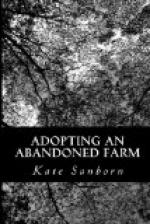—Yes, more varied than is generally supposed!
CHAPTER VIII.
THE PROSE OF NEW ENGLAND FARM LIFE
A life whose parlors have always been closed.
IK MARVEL.
Sunshine is tabooed in the front room of the house. The “damp dignity” of the best-room has been well described: “Musty smells, stiffness, angles, absence of sunlight. What is there to talk about in a room dark as the Domdaniel, except where one crack in a reluctant shutter reveals a stand of wax flowers under glass, and a dimly descried hostess who evidently waits only your departure to extinguish that solitary ray?”
At a recent auction I obtained twenty-one volumes of State Agricultural Reports for seventeen cents; and what I read in them of the Advantages of Rural Pursuits, The Dignity of Labor, The Relation of Agriculture to Longevity and to Nations, and, above all, of the Golden Egg, seem decidedly florid, unpractical, misleading, and very little permanent popularity can be gained by such self-interested buncombe from these eloquent orators.
The idealized farmer, as he is depicted by these white-handed rhetoricians who, like John Paul, “would never lay hand to a plow, unless said plow should actually pursue him to a second story, and then lay hands on it only to throw it out of the window,” and the phlegmatic, overworked, horny-handed tillers of the soil are no more alike than Fenimore Cooper’s handsome, romantic, noble, and impressive red man of the forest and the actual Sioux or Apache, as regarded by the cowboy of the West.
It’s all work, with no play and no proper pay, for Western competition now prevents all chance of decent profits. Little can be laid up for old age, except by the most painful economy and daily scrimping; and how can the children consent to stay on, starving body and soul? That explains the 3,318 abandoned farms in Maine at present. And the farmers’ wives! what monotonous, treadmill lives! Constant toil with no wages, no allowance, no pocket money, no vacations, no pleasure trips to the city nearest them, little of the pleasures of correspondence; no time to write, unless a near relative is dead or dying. Some one says that their only chance for social life is in going to some insane asylum! There have been four cases of suicide in farmers’ families near me within eighteen months.
This does not apply to the fortunate farmer who inherited money and is shrewd enough to keep and increase it. Nor to the market gardener, who raises vegetables under glass; nor to the owners of large nurseries. These do make a good living, and are also able to save something.
In general, it is all one steady rush of work from March to November; unceasing, uncomplaining activity for the barest support, followed by three months of hibernation and caring for the cattle. Horace Greeley said: “If our most energetic farmers would abstract ten hours each per week from their incessant drudgery and devote them to reading and reflection in regard to their noble calling, they would live to a better purpose and bequeath better examples to their children.”




